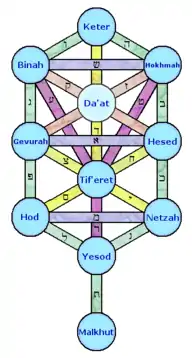| The Sefirot in Kabbalah | ||
|---|---|---|
 The Sefirot in Jewish Kabbalah
| ||
| Category:Sephirot | ||
Netzach (Hebrew: נצח, romanized: Nēṣaḥ, lit. 'eminence, everlastingness, perpetuity') is the seventh of the ten sefirot in the Jewish mystical system of Kabbalah. It is located beneath Chesed ('loving-kindness'), at the base of the "Pillar of Mercy" which also consists of Chokhmah ('wisdom'). Netzach generally translates to 'eternity', and in the context of Kabbalah refers to 'perpetuity', 'victory', or 'endurance'.
Jewish Kabbalah
Within the Sefiroth, Netzach sits geometrically across from Hod. This pairing makes up the third such group, the "tactical" sefirot, meaning that their purpose is not inherent in themselves, but rather as a means for something else.
These sefirot mark a turning point. Whereas the first two groups of sefirot deal with God's intrinsic will, and what it is that He desires to bestow upon man, these sefirot are focused on man: What is the most appropriate way for man to receive God's message? How can God's will be implemented most effectively?
Netzach refers to actions of God that are Chesed in essence, but are presented through a prelude of harshness. Hod refers specifically to those events where the "wicked prosper." It is retribution —Gevurah, "strength/restraint," in essence, but presented by a prelude of pleasantness.
Netzach is "endurance," the fortitude, and patience to follow through on your passions. It is paired with Hod as the righteous attributes related to group interactivity, with Netzach being leadership, the ability to rally others to a cause and motivate them to act; while Hod is community, the ability to do the footwork needed to follow through on ideas and make them happen. Netzach is identified with our right (left leg or foot) when the tree of life is portrayed on the human form, while Hod is on our left (right leg or foot).
The angelic order of Netzach is the Elohim, the ruling Archangel of which is Haniel. Its qlippothic counterpart is A'arab Zaraq.
References
External links
- Lessons in Tanya
- Kabbalah 101: Netzach & Hod Archived 2008-05-15 at the Wayback Machine